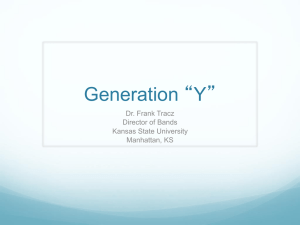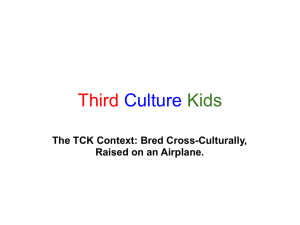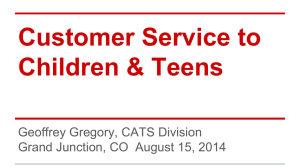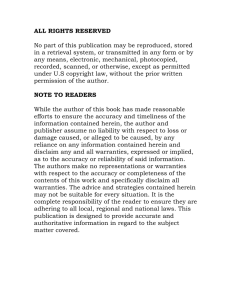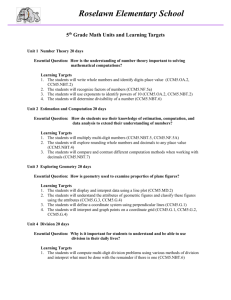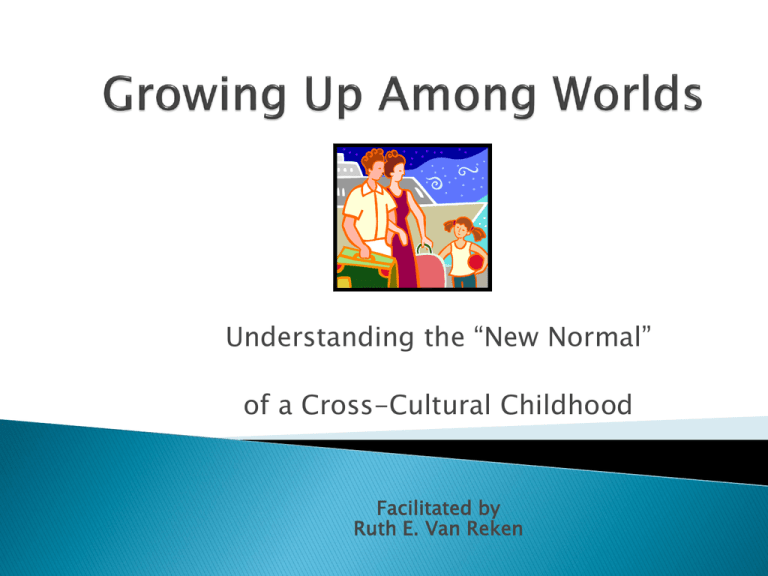
Understanding the “New Normal”
of a Cross-Cultural Childhood
Facilitated by
Ruth E. Van Reken
My story
Defining our terms
◦ Where we’ve been
◦ Where we are
Why a cross-cultural childhood matters
Why a highly mobile childhood matters
How to grow from both gifts and challenges
First Culture
(Home/Passport)
Third Culture
(International Lifestyle)
(“Neither/Nor World”)
Second Culture
(Host)
“A person who has spent
a significant part of his
or her developmental
years outside the
parents' culture(s)...
Cross-cultural lifestyle
High mobility
Expected repatriation
Often a “system identity”
In 1984, Dr. Ted Ward
declared Third Culture
Kids (TCKs) as the
“prototype citizens” of
the future.
Why?
A Cross-Cultural Kid (CCK) is a person who
is living in—or meaningfully interacting
with—two or more cultural environments for
a significant period of time during
developmental years of childhood (first 18
years of life).
◦ A Cross-Cultural Adult (CCA) is one who made
first significant cross-cultural interaction as an
adult
◦ Adult Cross-Cultural Kid (ACCK) is someone
who grew up as a CCK.
Ruth E. Van Reken, co-author, Third Culture Kids: The Experience of
Growing Up Among Worlds, 2002
Examples of Cross-Cultural Kids
TCKs
Bi (Double?)
cultural
Kids
Biracial
Kids
CrossCultural
Kids
Domestic
TCKs
Children of
Minorities
International
Adoptees
Children of
Children of Educational Children of
BorderImmigrants
CCKs
Refugees
landers
Bus. Kids Other
Mil. Kids
Miss. Kids
TCKs
Growing Complexity
Barack Obama’s Circles
CrossCultural
Kids
Bicultural
Kids
Privileged
Children of
Minorities
Discrimi
nated
Biracial
Kids
Children of
Immigrants
Domestic
TCKs
Educational
CCKs
Children of
Refugees
International
Adoptees
Children of
Borderlanders
Cross- Cultural Adults (CCAs) - ) Those who made
first significant cross-cultural interaction as an adult
Third Culture Adults (TCAs) - Those who make their
first long-term international cross-cultural move as
adults.
Cross-Cultural Kids (CCKs) - those who interact
menaingfully with various cultural worlds as children.
Third Culture Kids (TCKs) -“Children who accompany
their parents into another culture.”
Ruth Useem’s definition
Adult Cross-Cultural Kids - those who grew up as
CCKs of any sort
Third Culture Kids (ATCKs) - Those who grew up as
TCKs
Other?
Large world view vs. ignorance of passport culture
Switching between school and home culture vs. opportunity to
interact with others of different backgrounds
Linguistic skills vs. linguistic confusion
Cultural chameleon: adaptability vs. lack of true cultural balance
Arrogance: real vs. perceived
Belonging “everywhere and nowhere”
Great opportunity to travel/see the world vs. rootless and restless
Independence vs. isolation
Guardedness in forming close relationships
all rights reserved Ruth E. Van Reken
Can be effective cultural bridge
Language skills
Observational skills
Thinking “outside the box”
Adaptability
Confidence
To start something new
To move and start again
Question of identity
◦ “Which of my many selves am
I?”
◦ “I never feel like I belong
anywhere….”
Unresolved grief
◦ Depression
◦ Withdrawal, etc
all rights reserved Ruth E. Van Reken
What is the difference
between a traditional
monocultural
upbringing and a crosscultural upbringing?
“Customary beliefs, social forms,
and material traits of a racial,
religious, or social group.”
--Webster’s Tenth Collegiate Dictionary\
“. . . System of shared assumptions,
beliefs and values. It is the
framework from which we
interpret and make sense of life
and the world around us.”
--Paul Hiebert, Cultural Anthropology, 2d ed.
Dr. Gary Weaver’s Cultural Iceberg
Food
Traditions
Customs
Language
Values
Beliefs
Worldview
How is culture learned?
How is a sense of
“cultural balance”
learned?
How does that relate to
identity development?
Not the process
but the worlds in
which their
development
takes/took place
Home in Afghanistan
of Chinese Canadian mom,
White Canadian dad, children
attend multinational school
Parental
Sponsoring
Organization?
Caregivers
Cross-Cultural
Kids
School
Where They
Live Now
Previous
Place(s) They
Lived
Ethnic
Subculture?
Adapted from chart by Norma McCaig,
Founder of Global Nomads International
Foreigner
Hidden Immigrant
Look Different
Think Different
Look Alike
Think Different
Adopted
Mirror
Look Different
Think Alike
Look Alike
Think Alike
PolVan Cultural Identity Model @1996
Hidden Diversity— a diversity
of experience that shapes a
person’s life and world view
but is not readily apparent on
the outside, unlike the usual
diversity markers such as
race, ethnicity, nationality,
etc
Ruth E.Van Reken and Paulette Bethel, CIES,
2003.
“Chameleon”—tries to find
“same as” identity
“Screamer”—tries to find
“different from” identity
“Wallflower”—tries to find
“non-identity” (be invisible)
A common sense of
national identity
A similar sense of
“Where is home?”
In interpersonal relationships
◦ Spouses/significant others
◦ Peers at university or
workplace
◦ Teachers
Cycles of mobility
Frequency of mobility
Community of mobility
Each move involves going
through a transition cycle
◦ Multiple mini-transitions may
be in each big one
Involvement
Leaving (Change)
Transition
Entry
Re-involvement
Everyone in the family will
be going through transition
but not all at the same
pace!
Each transition cycle
involves loss as well as
potential gain
The loss of something you
love leads to grief
Grief will always be
expressed, either consciously
or unconsciously
Denial
Anger
Bargaining
Sadness/Depression
Withdrawal
Rebellion
Vicarious grief
Delayed grief
Denial
Anger
Acceptance
LOSSES
Bargaining
Sadness
Wheel model by Pam Davis, counselor
Lack of awareness
◦ Losses are often “hidden” because they are intangible
or invisible: What might some be?
Loss
Loss
Loss
Loss
Loss
Loss
Loss
Loss
Loss
Loss
Loss
Loss
of
of
of
of
of
of
of
of
of
of
of
of
a world
the dream
status
a sense of “system identity”
a sense of cultural balance
cultural cohesion in the family
lifestyle
possessions
relationships
system identity
the past that wasn’t
the past that was
Lack of permission to grieve
◦ Grief is discounted
◦ Grief is compared to the higher good
◦ Grief is denied
Lack of time to process
Lack of comfort
◦ Difference between comfort and encouragement
“Normalize” the process –
remember they are KIDS!!!!
◦ Understand the dynamics
◦ Recognize and validate
relationship with “international
culture” or “cross-cultural culture”
as well as national/family culture
Develop a strong sense of
family identity
◦ Use portable traditions
◦ Vacation as you travel
◦ Maintain close contact with
relatives here and “there”
◦ Keep threads of connection
strong
“Sacred objects”
For globally mobile families, try to keep a
permanent “home base” of some sort in passport
culture if you plan to return
Consider how each move works in the grand
scheme of entire family’s needs
Intentionally learn about places
you live and visit
◦ History
◦ Geography
◦ Culture
Maintain languages learned
Teach kids good packing skills!!
Application forms
Parent-teacher conferences
Writing, art, discussion in class
When TCKs/CCKs react
Remind them that they don’t
have to reject either the past
or the present to preserve the
other – they can be both/and
(But don’t be mad at them!)
Try to understand the “statement” they are making with their
behavior
◦ Is it the only way they know to try and find their unique identity?
◦ Is it grief?
◦ Is it fear of losing their past?
Help TCKs realize they can
be both/and, not either/or
◦ “My life is like Window Each part is
open and accessible, but I have to
operate in the one that’s on the
screen.”
◦ Journey of clarification
What we can do
◦ Build a RAFT
Reconciliation
Affirmation
Farewells
To people
To places
To pets
To possessions
Think Destination
◦ How do we build a RAFT for
different ages?
Name our losses,
(obvious & hidden)
sometimes by affirming
the past!
◦ Journal
◦ Scrapbook
◦ Talking to someone who
will listen without “fixing”
◦ Painting
◦ Music
“Unpack your bags and plant your trees”
Say hello well
◦ Accept invitations to meet others
◦ Help kids explore new environment
◦ Find good mentor
◦ Invite others over
Find ways to keep in
contact with the past
while moving to the
future
◦ Journey of clarification
◦ Internet
◦ Skype
For “reentry,” help children think
through the answer to “Where are
you from?” before they repatriate
For families sending children to
university in a culture outside
passport culture, maintain “sense
of home” here and seek to make
connections for support there
Remember your kids may
need some extra help
◦ Don’t assume they know all
you do
Tutor
Practical lessons from you!
Remind your kids that they
can never lose what they have
gained as TCKs/CCKs
◦ Moving towards the future
(including their passport culture)
is simply building on that
foundation
To quote Garth
Brooks…
◦ “I could have missed
the pain, but I’d ‘a
had to miss…the
DANCE!”
Garth Brooks, “The Dance”




